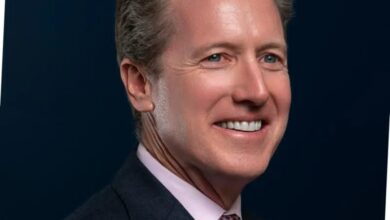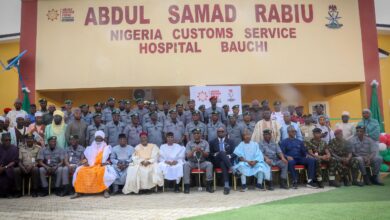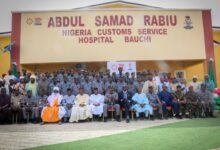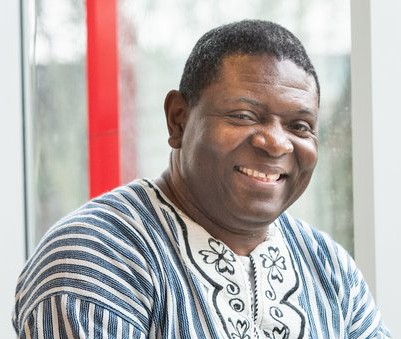
On November 6, 2023, nine Ugandan students walked out of a courtroom in Kampala with the news that they were free. They had been detained for more than a year, starting in October 2022, for participating in a peaceful protest against the proposed East African Crude Oil Pipeline (EACOP). They were violently arrested, denied bail and repeatedly beaten over four days in detention – just for taking to the streets to support a European Parliament resolution that condemns human rights violations along the proposed path of EACOP.
But now, finally, after fifteen court appearances, “common nuisance” charges against them were dropped. This was thanks to the resilience of the students themselves and the efforts of the top-tier lawyers who rendered their services, through Global Climate Legal Defense (CliDef)-the organization that Liberian Goldman Environment Prize winner, Alfred Brownell, set up and now leads.
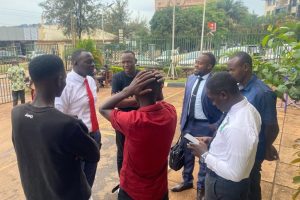 “I was moved to tears when I got the news. This is the kind of victory I have been fighting for, that I live for. I was a lawyer and environmental activist in my native Liberia. When I was forced into exile in 2016 after constant harassment and violent death threats against me and my family, I vowed that I would dedicate my life to helping others on the frontline, fighting for our planet and their survival.
“I was moved to tears when I got the news. This is the kind of victory I have been fighting for, that I live for. I was a lawyer and environmental activist in my native Liberia. When I was forced into exile in 2016 after constant harassment and violent death threats against me and my family, I vowed that I would dedicate my life to helping others on the frontline, fighting for our planet and their survival.
Brownell said:
“In my case, in Liberia, it was going up against the might of massive South-East Asian corporations, in cahoots with the government, clearing hundreds of thousands of hectares of indigenous forest to plant oil palm. In the case of the Ugandan students, it is standing up to the French corporation, TotalEnergies, whose pipeline will displace more than 100,000 people along 900 miles in two countries, and threaten the water and food security of millions more. The pipeline will generate over 34 million tons of carbon emissions a year, at a time when the world has acknowledged the urgent need to cut back on fossil fuel production.”
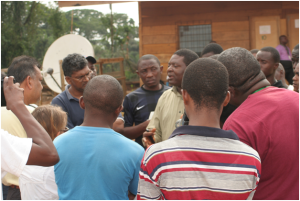 My own revelation came in 2010. I had known in theory what deforestation meant for the climate, but then I saw with my own eyes what it did to actual people, and to their lives. That year, I was called to consult with a Liberian community near my mother’s birthplace, which was threatened by deforestation. I stood on a hill and looked around at the devastation: a naked landscape with yellow bulldozers like locusts clearing the last remaining trees, the villagers standing behind me like disoriented zombies, unable even to find their way home in this post-apocalyptic landscape.
My own revelation came in 2010. I had known in theory what deforestation meant for the climate, but then I saw with my own eyes what it did to actual people, and to their lives. That year, I was called to consult with a Liberian community near my mother’s birthplace, which was threatened by deforestation. I stood on a hill and looked around at the devastation: a naked landscape with yellow bulldozers like locusts clearing the last remaining trees, the villagers standing behind me like disoriented zombies, unable even to find their way home in this post-apocalyptic landscape.
For the next six years, I fought the palm oil corporations and our government. Our legal team consisted of just one person-me-and sometimes an intern. Ranged against us were formidable armies of corporate lawyers funded by the state and by global capital. I learned a crucial lesson. It is one that lies behind the formation of CliDef last year and our victory for the Ugandan students earlier this month: we cannot win this climate war armed with chewing gum and pen-knives, given that we are up against the precision-guided missiles of the other side.
We just can’t fight these powerful industries and governments causing climate chaos unless the people who are located on the frontlines are safe enough to carry on their resistance. We need to have their backs, because God knows, by standing in the way of ventures such as EACOP, they certainly have ours.
And so, when I got the call about the Uganda arrests one Friday night last October, I knew exactly what was needed. A pro bono legal aid lawyer had valiantly stepped in to help the detainees, but had been unable to secure a bond. Despite the evidence that they were being assaulted by their captors, these nine brave youngsters were going to spend the weekend behind bars. Their next court appearance was on Monday morning. When they walked into the courtroom, they needed to look up and see the country’s best criminal defense lawyers standing up to defend them.
We made that happen. We had only just started CliDef, but we had enough resources in place to get a team of lawyers from one of Uganda’s top firms into the courtroom. The defendants were granted a bond and, a year later, our lawyers were finally able to get all charges dropped. But something more important has happened too, in terms of the sustainability of the movement. The defendants and their fellow activists were emboldened.
They knew they could keep on fighting. And they did. In fact, even while they were on bail, three of the students went back to the streets, took part in another protest, and were arrested again. Just a few weeks ago, about fifty Ugandan students marched to parliament in a “Fridays for Future” protest against EACOP. Police arrested four activists. We are ready to defend them when they appear in court this week.
If the goal of TotalEnergies and its supporters in the Ugandan government was to send a message of intimidation to anyone wishing to stand up against EACOP, we at CliDef have helped the Ugandan movement send a message back: “You can’t bully us into silence.” Our lawyers will show the state up if it does not have grounds for prosecution – and the world will be watching, given the media we will attract. We hope that this will act as a deterrent against further arrests as the movement against EACOP grows. But if it doesn’t, we are prepared.
From my own experience in Liberia, I know the effect of a positive legal outcome on a grassroots movement. When you go to court and secure a bond and then a release, especially in the face of a system that has historically treated people like dirt, you restore in them a fundamental trust in their cause. By standing by them when they face reprisals, you reaffirm their values and validate their efforts:
It’s not just me, fighting for my survival. Others believe in this cause too, because it’s right.
Our experiences in Uganda have confirmed another foundational principle of CliDef’s work. It’s never enough just to provide legal assistance, given the many ways frontline defenders are threatened: not just through legal means, but also through physical violence, psychological and digital intimidation and harassment, and even financial blacklisting.
For example, we have seen the prohibition of the receipt of foreign funds or stripping NGOs of their legal status. In the Ugandan case, we understood the need for holistic – including psychosocial – support for the accused, even just to make sure they all showed up in court, given the other pressures on their lives. This was a key part of what CliDef was able to do: to coordinate with local partners to get the students additional help beyond our legal support.
I have learned another valuable lesson from the Ugandan experience, one that confirms what I experienced in Liberia. All too often, we are in the support role – whether we are an organization like CliDef or the philanthropists who fund it-work on the “rapid response” model. We scrambled last October, after I got that call, and we were able to secure the funding needed to help the Ugandan detainees. But we might not have been ready in time, and this case might have turned out differently had we not been able to provide the legal support we did.
We have learned how important it is to anticipate the backlash, and to preposition resources accordingly. And so, a key part of our work is figuring out where the fossil fuel companies are planning to go next, as they expand their planet-destroying operations.
We are already operating in the Democratic Republic of Congo, Mozambique, and the Philippines, but our list of priority hotspot countries is long, and we need to be working in at least a dozen more countries if we really want to serve the neediest climate defenders.
Brownell explains that this principle of preparedness governs CliDef approach to the COP28 meeting in the United Arab Emirates, a country with even stricter laws than Egypt. Last year, at Sharm-el-Sheik, CliDef provided the first-ever Legal Protection Center at COP27.
These included a “Know the Law” guide and a series of webinars that prepared many hundreds of civil society attendees to participate as safely as possible. We cannot know how many legal reprisals we helped to forestall, but we estimate in the dozens, at least. Through our Egyptian partner, we also supported the over one thousand Egyptian protesters detained; many of them are still imprisoned today.
We have repeated our webinars again this year. Once more, we have put into place a legal protection hotline, a comprehensive “Know the Law and Holistic Security” guide, and a group of monitors to identify, prevent, and troubleshoot problems. Post -COP, CliDef will provide legal advice for those who might face reprisals when they get back home.
Brownell was in the midst of preparing for the organisation’s webinar for COP28, when he got the news that the charges against the nine Ugandan activists had been dropped.
“Our local partners shared some videos of the now-free students, whooping with joy. This celebratory moment brought to mind a similar experience, from 2014, in Liberia with a woman named Ma Anna Tue.”
Ma Anna Tue was an elderly grandmother whom I first met on a visit to a remote part of Liberia, where locals had taken a stand against a huge state-supported deforestation program by the US-listed Singapore Corporation, Golden Veroleum. Ma Anna invited me into her home and confided her doubt to me about whether “small people” such as herself could ever stand up to the might of the state. In our conversation, she came to understand that she had rights, and as a result she became a stalwart, mobilizing the women of her community. One day, she organized a protest to stop further clearing. Even though she was with her children and grandchildren, the police were very brutal. They beat her up, stripped her, threw her in the back of a truck, and took her to prison.
We fought for Ma Anna’s release, and eventually, we won. After two debilitating years in jail, she returned to a community almost destroyed by deforestation. But she took up the fight again, demonstrating her community’s refusal to accept its own annihilation. In 2018, she and her fellow villagers finally won. After I was successfully able to present their petitions to the global body that regulates the palm oil industry, the body ruled that Golden Veroleum had used coercion, and had violated local groups’ rights to consent.
Right now, I am looking at this photograph of one of the Ugandan students, walking out of the magistrate’s court on November 6, after the cases against him and his eighth co-accused have been dropped. The smile on Alex Lyazzi Wasswa’s face is as wide as his arms raised in a joyful, victorious “V.” He will stop EACOP just as Ma Anna Tue stopped Golden Veroleum and just as the activists currently gathering at COP28 will hold their countries to their obligations.
It’s our obligation, as lawyers and as funders to help them in this task. They are the planet’s and its peoples’ first responders. They are our firewall. They protect us and our children’s future too.







